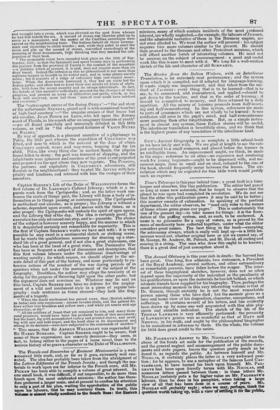Captain SHERER'S Life of the Duke of WELLINGTON forms the
first volume of Dr. LARDNER's Cabinet Library; which is a se- parate work from the Cyclopedia ; and, as the latter work em- braces the circle of things past, the Library will form a body of in- formation as to things passing or contemporary. The Cyclopedia is methodical and circular, as is proper; the Library is without a scheme, dependent upon events, and moves with the times, as is also proper: the Cyclopedia will embody the spirit of ages agone, and the Library that of the day. The idea is certainly good; the execution has only advanced one step, and is—passable. The choice of the subject is however scarcely happy, and the manner in which it is despatched certainly not remarkable for superiority. This is the first of Captain SHERER'S works we have met with : it is very possible he may excel in a sentimental sketch or striking scene, but he wants the qualifications necessary for drawing up a stan- dard life of a great general, and if not also a great statesman, one who has been at the bead of a great state. The Peninsular War has been so frequent a subject of discussion and description, that this first volume labours _under the additional disadvantage of wanting novelty ; for which reason, we should object to the mi- nute detail of this part of the history, and more particularly to ex- tensive notices of the conduct of the war during periods or in quarters when not under the management of the subject of the biography. Doubtless, the author may allege the necessity of so doing for the purpose of throwing light upon the other parts : but the argument does not convince us. Whatever may be said on this head, Captain SHERER can have no defence for the employ- ment of a wild and incoherent style in a piece of regular bio- graphy : such sentences as these abound—they look like frag- ments of a tragedy. " When the moral excitement has passed away, they (British soldiers in India) sink into supineness : disease invades them, and the gallant fel- lows wither into bloodless and yellow men ; and while yet scarce mid-age themselves, so die." " All the artillery of Junot that yet remained to him, and many thou- sand prisoners, would have been the probable fruits of this movement; but the heart, big with accomplished victory and granted desires, and swell- ing with new and bold hopes, and the head clear in its discernment and strong in its decision—were now subjected to the commands of another." This means, that Sir ARTHUR WELLESLEY was superseded by Sir HARRY BURRARD. Captain SHERER ought to be aware, that some of these expressions are scarcely decorous—they seem, in fact, to belong rather to the pages of a loose novel, than to the Serious history of so grave a character as the Duke of WELLINGTON.


























 Previous page
Previous page